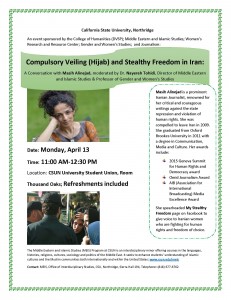CSUN Q&A to tackle the Issue of Compulsory Veiling
 Since 9/11, the Muslim faith – along with many of its practices, such as veiling – have been shrouded in misconception. With Islamic State in Iraq and the Levant (ISIL) in the news almost every day, the topic remains fresh and only aggravates wounds different sides.
Since 9/11, the Muslim faith – along with many of its practices, such as veiling – have been shrouded in misconception. With Islamic State in Iraq and the Levant (ISIL) in the news almost every day, the topic remains fresh and only aggravates wounds different sides.
Masih Alinejad, a prominent Iranian journalist renowned for her critical and courageous writings against state repression and violation of human rights, will explore the issues surrounding compulsory veiling during, a special presentation California State University, Northridge, next week.
Her talk, “Compulsory Veiling (Hijab) and Stealthy Freedom in Iran,” will take place Monday, April 13, from 11 a.m. to 12:30 p.m. in the University Student Union, Thousand Oaks room.
“She (Alinejad) told me, ‘I don’t want to lecture, I’m not a professor. I want you to ask me the questions you think are going to be most important and relevant to your students, let’s have a conversation,’” said Nayereh Tohidi, director of Middle Eastern and Islamic studies (MEIS) and of gender and women’s studies.
In 2009, Alinejad fled Iran because of her advocacy for women’s rights, freedom of the press and freedom of speech in her journalistic writings. She also wrote about the corruption in the government, inspiring some while angering others. She has received numerous honors for her work, including: the 2015 Geneva Summit for Human Rights and Democracy Award, Omid Journalism Award and Association for International Broadcasting Media Excellence Award.
“I selected her to come and speak for a number of reasons,” Tohidi said. “Because of her background and contributions, she is internationally prominent. Thanks to her clever journalistic work, we get to hear from a lot of people, such as families of political prisoners whose stories we wouldn’t have heard from without her savvy, creative way.
“She’s a very bright, passionate and inspiring role model, not only for learning about Iran, but also as a woman who has turned into an agent of change,” continued Tohidi. “One of the things that I think makes her so unique is that she comes from a humble upbringing. She grew up in a small, working-class village, and because she’s brilliant, she started excelling in school. She then lived in urban areas of Iran, and after fleeing, moved to Europe and then eventually the U.S. Because of this, she has lived and worked with Muslim women in a verity of communities and has a perspective and understanding of the hijab that most don’t.
Alinejad has spearheaded the ‘My Stealthy Freedom’ campaign page on Facebook, which provides a space and gives voice to those Iranian women who resist compulsory veiling by taking their hijab off in public, for a short while, and take pictures or video of those “stealthy free moments” and post it to the site. While Alinejad no longer wears her hijab, she said it should still be a personal choice made by the woman, not a compulsory one forced by the state.
“She didn’t mean for it to become a campaign but it did,” said Tohidi. “When these women take off the forced hijab, they are being very courageous and inspiring to others to defy repressive rule.”
Tohidi said she hopes that attendees of the event walk away with a “more complex understanding” of the hijab among, Muslims, including the one in the context Iranian culture and politics that you couldn’t get “by watching a TV sound bite.”
“The debate on banning the veil has been such a big issue in Turkey and some European Western countries,” said Tohidi. “Hopefully by listening to a real Muslim woman, with lived experience of forced veiling, we can better understand the value of freedom of choice. This can humanize a lot of misunderstandings and fears about Iran. Not all Iranians are anti the west. Many, especially the younger generation, want to be a part of the world community and build normal peaceful relationship with all countries, especially the U.S.”
For more information on the event, please visit MEIS website at www.csun.edu/meis.
California State University, Northridge’s College of Humanities; Middle Eastern and Islamic Studies (MEIS); Women’s Research and Resource Center; Gender and Women’s Studies; and Journalism departments are sponsoring the lecture.

 experience
experience